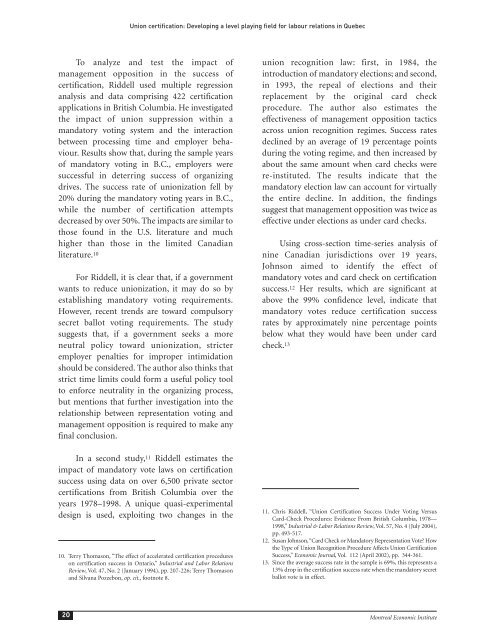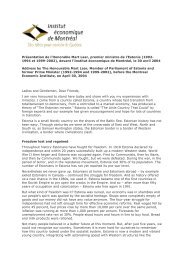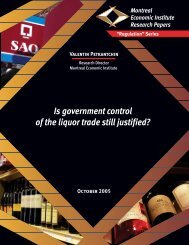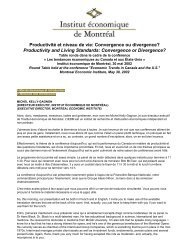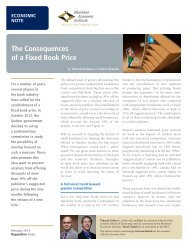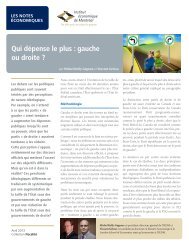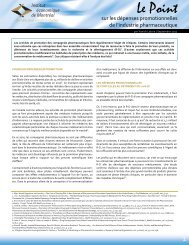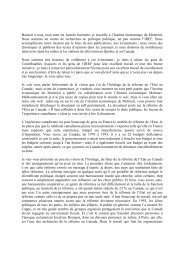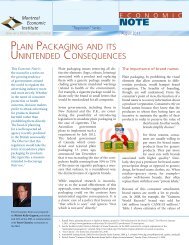Union certification: Developing a level playing field ... - LabourWatch
Union certification: Developing a level playing field ... - LabourWatch
Union certification: Developing a level playing field ... - LabourWatch
Create successful ePaper yourself
Turn your PDF publications into a flip-book with our unique Google optimized e-Paper software.
<strong>Union</strong> <strong>certification</strong>: <strong>Developing</strong> a <strong>level</strong> <strong>playing</strong> <strong>field</strong> for labour relations in QuebecTo analyze and test the impact ofmanagement opposition in the success of<strong>certification</strong>, Riddell used multiple regressionanalysis and data comprising 422 <strong>certification</strong>applications in British Columbia. He investigatedthe impact of union suppression within amandatory voting system and the interactionbetween processing time and employer behaviour.Results show that, during the sample yearsof mandatory voting in B.C., employers weresuccessful in deterring success of organizingdrives. The success rate of unionization fell by20% during the mandatory voting years in B.C.,while the number of <strong>certification</strong> attemptsdecreased by over 50%. The impacts are similar tothose found in the U.S. literature and muchhigher than those in the limited Canadianliterature. 10For Riddell, it is clear that, if a governmentwants to reduce unionization, it may do so byestablishing mandatory voting requirements.However, recent trends are toward compulsorysecret ballot voting requirements. The studysuggests that, if a government seeks a moreneutral policy toward unionization, stricteremployer penalties for improper intimidationshould be considered. The author also thinks thatstrict time limits could form a useful policy toolto enforce neutrality in the organizing process,but mentions that further investigation into therelationship between representation voting andmanagement opposition is required to make anyfinal conclusion.In a second study, 11 Riddell estimates theimpact of mandatory vote laws on <strong>certification</strong>success using data on over 6,500 private sector<strong>certification</strong>s from British Columbia over theyears 1978–1998. A unique quasi-experimentaldesign is used, exploiting two changes in the10. Terry Thomason, “The effect of accelerated <strong>certification</strong> procedureson <strong>certification</strong> success in Ontario,” Industrial and Labor RelationsReview, Vol. 47, No. 2 (January 1994), pp. 207-226; Terry Thomasonand Silvana Pozzebon, op. cit., footnote 8.union recognition law: first, in 1984, theintroduction of mandatory elections; and second,in 1993, the repeal of elections and theirreplacement by the original card checkprocedure. The author also estimates theeffectiveness of management opposition tacticsacross union recognition regimes. Success ratesdeclined by an average of 19 percentage pointsduring the voting regime, and then increased byabout the same amount when card checks werere-instituted. The results indicate that themandatory election law can account for virtuallythe entire decline. In addition, the findingssuggest that management opposition was twice aseffective under elections as under card checks.Using cross-section time-series analysis ofnine Canadian jurisdictions over 19 years,Johnson aimed to identify the effect ofmandatory votes and card check on <strong>certification</strong>success. 12 Her results, which are significant atabove the 99% confidence <strong>level</strong>, indicate thatmandatory votes reduce <strong>certification</strong> successrates by approximately nine percentage pointsbelow what they would have been under cardcheck. 1311. Chris Riddell, “<strong>Union</strong> Certification Success Under Voting VersusCard-Check Procedures: Evidence From British Columbia, 1978—1998,” Industrial & Labor Relations Review, Vol. 57, No. 4 (July 2004),pp. 493-517.12. Susan Johnson,“Card Check or Mandatory Representation Vote? Howthe Type of <strong>Union</strong> Recognition Procedure Affects <strong>Union</strong> CertificationSuccess,” Economic Journal, Vol. 112 (April 2002), pp. 344-361.13. Since the average success rate in the sample is 69%, this represents a13% drop in the <strong>certification</strong> success rate when the mandatory secretballot vote is in effect.20 Montreal Economic Institute


